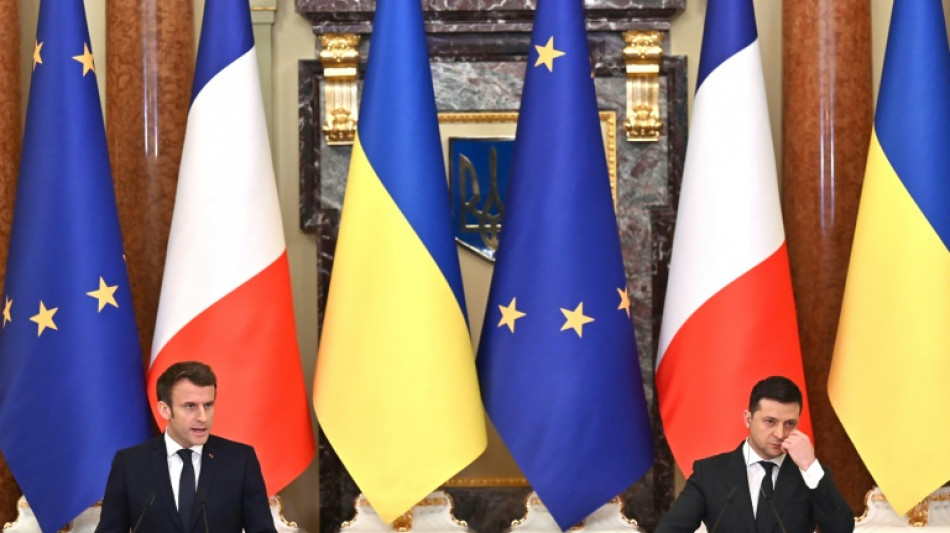
Macron sees path to calm Russia tensions after Ukraine push

French President Emmanuel Macron said Tuesday he saw a path forward on easing tensions with Russia over Ukraine, after conducting an urgent round of shuttle diplomacy between Moscow and Kyiv.
Macron held talks with Ukraine's President Volodymyr Zelensky in Kyiv a day after a five-hour meeting at the Kremlin with Russia's Vladimir Putin, as the West scrambles to defuse fears Moscow could invade its ex-Soviet neighbour.
The French leader said he now saw the "possibility" for talks involving Moscow and Kyiv over the festering conflict in the east of the country to move forward, and "concrete, practical solutions" to lower tensions between Russia and the West.
"We cannot under-estimate the moment of tension that we are living through," Macron said at a joint press conference after meeting Zelensky.
"We cannot resolve this crisis in a few hours of talks," he said. "It will be the day and the weeks and the months to come that will allow us to progress."
Macron -- who now heads to Berlin for talks with the leaders of Germany and Poland -- said Putin had told him that Russia "would not be the source of an escalation," in the situation, despite amassing more than 100,000 troops and military hardware on Ukraine's border.
Zelensky said he hoped a meeting of high-ranking officials Thursday in Berlin could pave the way for a summit with the leaders of Ukraine, Russia, France and Germany aimed at reviving the stalled peace plan for Kyiv's conflict with Moscow-backed separatists.
Putin -- who has demanded sweeping security guarantees from NATO and the United States -- said after his talks with Macron that Moscow would "do everything to find compromises that suit everyone".
He said several proposals put forward by Macron could "form a basis for further steps" on easing the crisis over Ukraine, but did not give any details.
- French proposals -
At the same time as sending its military hardware to Ukraine's borders, Putin has issued demands the West says are unacceptable, including barring Ukraine from joining NATO and rolling back alliance forces in eastern Europe.
The French presidency said Macron's counter proposals included an engagement from both sides not to take any new military action, the launching of a strategic dialogue and efforts to revive the peace process for Ukraine's conflict.
It also said an agreement would ensure the withdrawal of some 30,000 Russian soldiers from Belarus at the end of joint military exercises later this month.
The Kremlin insisted that it never had any intention of leaving the troops permanently on Belarusian territory.
The West faces a tough task trying to convince a wary Zelensky to accept any compromises.
Kyiv has laid out three "red lines" that it says it will not cross to find a solution -- no compromise over Ukraine's territorial integrity, no direct talks with the separatists and no interference in its foreign policy.
Moscow is pressuring Ukraine to offer concessions to the Russian-backed rebels who have been fighting Kyiv since 2014 in a conflict that has claimed over 13,000 lives.
Ukraine says the Kremlin wants to use the two breakaway eastern regions it supports as leverage to keep the country under Moscow's sway.
Russia has denied it is planning an invasion -- but the US warns it has massed 70 percent of the forces it would need for a large-scale incursion.
Moscow kept bolstering its forces around Ukraine Tuesday as it announced six warships were heading to the Black Sea from the Mediterranean as part of previously planned global maritime maneouvres.
Ukraine's Defence Minister Oleksiy Reznikov told local television that Kyiv was planning to hold its own exercises involving Western-supplied anti-tank missiles and Turkish combat drones in response to the Russian-Belarusian drills.
- Biden threatens pipeline -
As Macron sought a diplomatic solution with Kyiv, US President Joe Biden ramped up the pressure on Moscow Monday by warning he would "end" the controversial new Nord Stream 2 gas pipeline from Russia to Europe if tanks rolled into Ukraine.
Biden's declaration at a press conference with German Chancellor Olaf Scholz was the bluntest so far on the fate of the massive pipeline, which is complete but has yet to begin funnelling natural gas.
Scholz was less direct and said only that Berlin was "united" with Washington in imposing sweeping sanctions on Russia, declining to mention the pipeline by name.
burs-del/mm/yad
A. Lefebvre--BTZ

 London
London

 Manchester
Manchester
 Glasgow
Glasgow
 Dublin
Dublin
 Belfast
Belfast
 Washington
Washington
 Denver
Denver
 Atlanta
Atlanta
 Dallas
Dallas
 Houston Texas
Houston Texas
 New Orleans
New Orleans
 El Paso
El Paso
 Phoenix
Phoenix
 Los Angeles
Los Angeles



